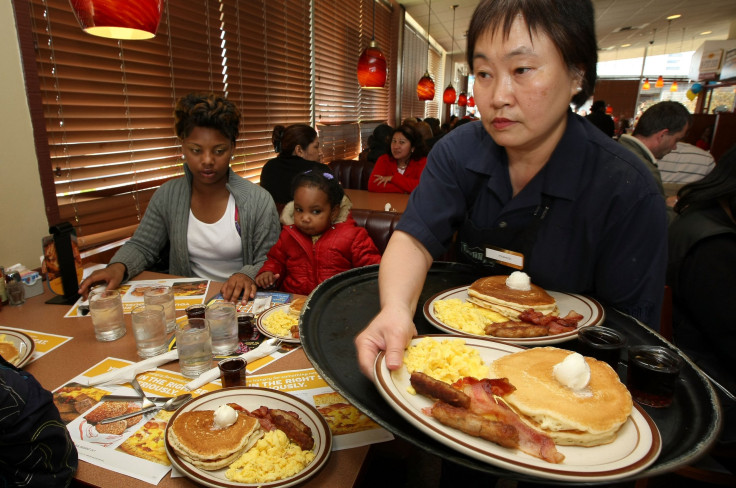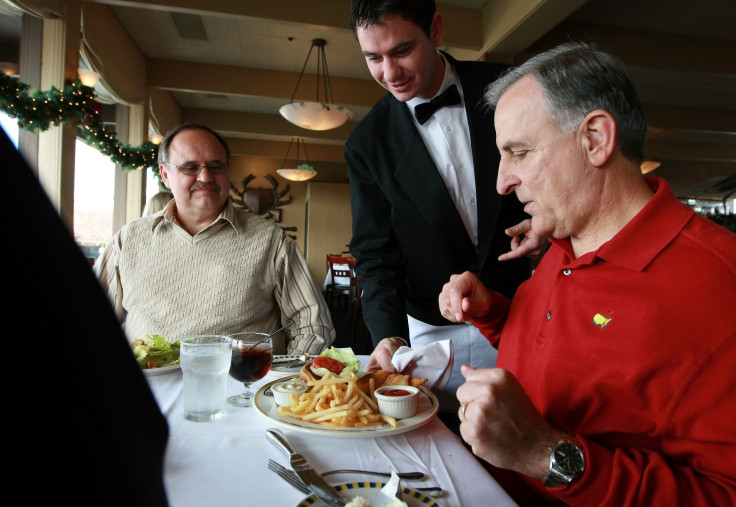Danny Meyer Ends Tipping At His Restaraunts: Will Servers Suffer As Policy Spreads Across US?

In a bold announcement earlier this week that shocked the hospitality industry, Union Square Hospitality Group declared its decision to eliminate tipping at its restaurants by the end of next year. CEO Danny Meyer's New York City empire includes the famed Gramercy Tavern and Union Square Café, along with 11 other eateries in the nation’s cultural capital.
"It's troubled me for 21 years that the tipping system is antithetical to creating a real profession for people who takes their jobs seriously," Meyer told CNBC Friday. "You don't tip your doctor if they do a good job. You don't tip the airline pilot if the plane lands. ... It's actually a demeaning practice."
Meyer's recent announcement to end tipping and raise menu prices has captured the attention of the hospitality world. As the elimination of tipping has started to gain traction in the United States, restaurant owners and managers who have adopted the policy have said it leads to improved morale and less pay discrepancy between front-of-house and back-of-house workers. But professional servers who make a living off the generous tips they receive at higher-priced restaurants could be at a disadvantage.
From fine-dining establishments in San Francisco, including Atelier Crenn, to casual dining eateries like Packhouse in Kentucky, no-tipping policies have sprung up at increasing rates from coast to coast. The myriad reasons for implementing no-tipping policies include increased equality between workers and more pay stability. The ways in which servers are compensated varies greatly, with some restaurants offering salaries and others providing a percentage of sales.

Justin Steel, owner of Bar Marco in Pittsburgh, an upscale eatery with a simple menu and creative cocktails, rolled out a no-tipping policy in January. The restaurant offers employees a salary and health benefits instead of tips. The payment system was implemented to eliminate pay discrepancy between workers. Prices increased a bit, and management made sure employees were on board with the policy before implementing it. How the no-tipping rule is enacted is vital to the policy’s success, Steel said.
“The narrative that the staff gives, that’s the most important part of this; how it’s communicated to the public,” Steel said. “The narrative from staff to customer has to be air-tight, you’ve got to be firm, and say that ‘We do not accept tips.’ You see people who go to other nontip restaurants and there is still a tip line, which can be awkward for the customer.”
Packhouse in Newport, Kentucky, introduced its no-tipping policy in January 2014. The decision came as owner Bob Conway saw the rise in popularity for fast, casual restaurants, like Panera Bread and Chipotle, which don't accept tips. Conway wanted to create a similar, simple dining environment for his customers, as well as help servers who were getting poor tips on large checks. Packhouse, a casual dining spot that serves hand-packed meats, now offers its servers $10 an hour or 20 percent of the servers’ sales, whichever is higher. While the move has been successful for Packhouse, Conway acknowledged that fine-dining restaurants might not benefit from a nontipping policy.
“I am really surprised Danny Meyer did it. His servers are making a lot of money. … His concern was that servers make more money than managers, and it’s hard for managers to sit there and watch their servers make more than them,” Conway said. “For high-end restaurants, I don’t think it’s in the server’s interest. … Casual dining is where it will work the best.”

Emily Davidow, 21, a full-time server at the Social Kitchen and Bar, a fine-dining restaurant in Birmingham, Michigan, said that restaurants frequented by customers who don't tip well, such as teenagers, might benefit from a policy that replaces tips with wages based on a percentage of sales, like Packhouse does. However, Davidow makes good tips, and said a salary or minimum wage would be a disadvantage, especially in high-end restaurants.
“A minimum wage and salary would be unfair. … If I were to be getting anywhere near minimum wage, I would be getting a huge loss,” Davidow said. “In the service industry, especially at a high-end restaurants, what you make is dependent on your skill level. Someone with more menu knowledge will walk away with more, and the salary or minimum wage would have to reflect that [difference in] skill knowledge.”

Manuel Montalban, owner of Manos Nouveau, a high-end Latin fusion restaurant in San Francisco, decided to end tipping in May. He said the policy change has been successful and wishes he had done it sooner. His decision was largely motivated by disproportionate pay earned between servers and kitchen staff. He admitted that servers do walk away with a little less than before.
"People who have been doing serving for awhile, they can’t digest it because it's contrary to everything they’ve been taught," Montalban said.
In many countries, including Japan and France, tipping is not expected. There are reports that tipping does not necessarily incentivize hard work or assure better service. One researcher, Michael Lynn, a professor at Cornell’s School of Hotel Administration in Ithaca, New York, found perceived service quality accounts for only 2 percent of the variation between tips.
Davidow, the Michigan server, said there is a way to enforce no-tipping policies without customers having to fret about bad service. "The server knows how much they are going to walk away with, so I would imagine the service would not be as important to them because they are already given that money," Davidow said. "With that being said, wages based on the percentage of the server's sales wouldn’t necessarily decrease the service."
But Jennifer Moleski, 34, a professional server who has been in the industry for 12 years, is strongly against nontipping policies.
“I think that it will lower the standard of service,” said Moleski, who works at a fine-dining restaurant in Colorado Springs, Colorado. “What's the motivation to hustle to refill water, wine and cocktails, to walk guests to the restroom, to give my all to every guest in the restaurant if I am earning the same amount whether I go the extra mile or not? The only counter to that would be a management team that demands excellence, and there are not too many of those leaders and systems out there."
© Copyright IBTimes 2024. All rights reserved.






















